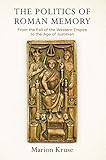The Politics of Roman Memory : From the Fall of the Western Empire to the Age of Justinian / Marion Kruse.
Material type: TextSeries: Empire and AfterPublisher: Philadelphia : University of Pennsylvania Press, [2019]Copyright date: ©2020Description: 1 online resource (304 p.)Content type:
TextSeries: Empire and AfterPublisher: Philadelphia : University of Pennsylvania Press, [2019]Copyright date: ©2020Description: 1 online resource (304 p.)Content type: - 9780812251623
- 9780812296471
- 909.098 21 23
- online - DeGruyter
| Item type | Current library | Call number | URL | Status | Notes | Barcode | |
|---|---|---|---|---|---|---|---|
 eBook
eBook
|
Biblioteca "Angelicum" Pont. Univ. S.Tommaso d'Aquino Nuvola online | online - DeGruyter (Browse shelf(Opens below)) | Online access | Not for loan (Accesso limitato) | Accesso per gli utenti autorizzati / Access for authorized users | (dgr)9780812296471 |
Frontmatter -- Contents -- A Note on Transliteration -- Introduction. Roman History After the Fall of Rome -- Chapter 1. New Romans in the Age of Anastasius -- Chapter 2. Mythistory and Cultural Identity in New Rome -- Chapter 3. Administrative Reform and Republican History -- Chapter 4. The Abolition of the Consulship -- Chapter 5. The Fall of Rome in the Age of Justinian -- Chapter 6. Apostolic History and the Church of (New) Rome -- Conclusion -- Appendix 1. Selected Chronology of the Fifth and Sixth Centuries ad -- Appendix 2. Ordinations of the Bishops of Rome and Constantinople -- Notes -- Bibliography -- General Index
restricted access online access with authorization star
http://purl.org/coar/access_right/c_16ec
What did it mean to be Roman after the fall of the western Roman empire in 476, and what were the implications of new formulations of Roman identity for the inhabitants of both east and west? How could an empire be Roman when it was, in fact, at war with Rome? How did these issues motivate and shape historical constructions of Constantinople as the New Rome? And how did the idea that a Roman empire could fall influence political rhetoric in Constantinople? In The Politics of Roman Memory, Marion Kruse visits and revisits these questions to explore the process by which the emperors, historians, jurists, antiquarians, and poets of the eastern Roman empire employed both history and mythologized versions of the same to reimagine themselves not merely as Romans but as the only Romans worthy of the name.The Politics of Roman Memory challenges conventional narratives of the transformation of the classical world, the supremacy of Christian identity in late antiquity, and the low literary merit of writers in this period. Kruse reconstructs a coherent intellectual movement in Constantinople that redefined Romanness in a Constantinopolitan idiom through the manipulation of Roman historical memory. Debates over the historical parameters of Romanness drew the attention of figures as diverse as Zosimos—long dismissed as a cranky pagan outlier, but here rehabilitated—and the emperor Justinian, as well as the major authors of Justinian's reign, such as Prokopios, Ioannes Lydos, and Jordanes. Finally, by examining the narratives embedded in Justinian's laws, Kruse demonstrates the importance of historical memory to the construction of imperial authority.
Mode of access: Internet via World Wide Web.
In English.
Description based on online resource; title from PDF title page (publisher's Web site, viewed 27. Jan 2023)


